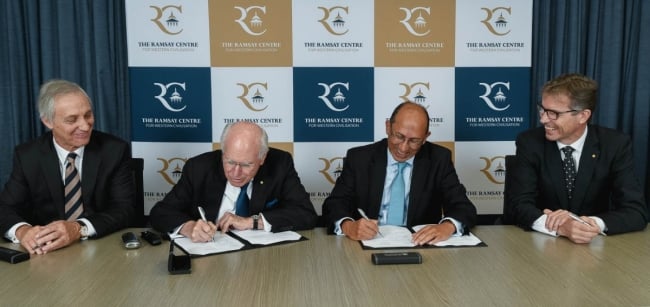You have /5 articles left.
Sign up for a free account or log in.

From left: Ramsay Centre for Western Civilisation CEO Simon Haines, Ramsay Centre chairman John Howard, University of Queensland chancellor Peter Varghese and Queensland vice chancellor and president Peter Høj.
Courtesy of the University of Queensland
A second Australian university has signed an agreement worth 50 million Australian dollars ($33.8 million) with a politically conservative foundation to offer programs in Western civilization, providing a rare infusion of money for the humanities but raising concerns among many faculty members and students about academic freedom, undue donor influence and what some describe as the retrograde nature of a curriculum that places the West in the center.
The agreement between the University of Queensland -- one of Australia’s elite Group of Eight universities -- and the Ramsay Centre for Western Civilisation will fund the hiring of 10 full-time academic staff and 150 scholarships for students who enroll in one of two undergraduate programs in Western civilization. The agreement is for a fixed term of eight years and calls for a panel of not more than four academics -- made up of a Ramsay Centre representative, a UQ representative and two other academics chosen jointly by Ramsay and UQ -- to review the program in its fourth year.
A Ramsay Centre representative will be entitled to sit on hiring committees, though the memorandum of understanding emphasizes that appointments “will be chaired by a member of UQ’s senior management; the chair has the ultimate authority over the outcome of the selection process.”
“As has been made clear since negotiations with the Ramsay Centre began, UQ will maintain autonomy over all key governance arrangements including course content, teaching standards, student admissions, selection of scholarship applicants, staff appointments and academic and intellectual freedom,” Peter Høj, Queensland’s president and vice chancellor, said in a statement.
Høj said the gift offers the “opportunity to offer a rigorous sequence of study focused on small-group discussion, a study abroad program and student-centered learning.” Classes in the program will generally be capped at 10 students, according to the MOU.
“This level of investment in the humanities at UQ comes at a time when opportunities to maintain these foundational disciplines are diminishing,” Høj said. “What we have ahead of us is a transformational opportunity for talented future students who will be able to pursue a liberal arts education that will be both challenging and rewarding and will equip students with the collaborative and persuasive skills to bring about meaningful change.”
Many Queensland professors and students have raised concerns about the agreement with Ramsay, and it was opposed by the UQ branch of the National Tertiary Education Union (the NTEU). The debates are somewhat analogous to debates in the U.S. about universities accepting Charles Koch Foundation money for academic programs and faculty hires.
“Our concerns have largely been about academic freedom with the problem of fixed-term funding by a politicized private foundation, which means that essentially they can pull the funding if they think it’s not serving their political and ideological interests,” said Andrew Bonnell, the president of Queensland’s NTEU branch and an associate professor of history.
“There are concerns about university independence and autonomy around the center representatives sitting on the selection committees for staff appointments, and even though the university insists they’re maintaining independence, they’re still allowing an outside body to essentially purchase seats on selection committees,” Bonnell said. He added, “If there's someone at the table who holds the purse strings, I can't see that that is not going to exercise an influence.”
Bonnell also said that a lot of NTEU members view as "retrograde" the attempt to revive the concept of Western civilization as an organizing curricular principle decades after many universities have moved on to more comparative approaches. "It fits in with the political agenda of some of the backers of putting a more positive face on the history of colonialism in Australia," he said.
Queensland students overwhelmingly registered their opposition to the Ramsay Centre program at a general meeting that about 500 students attended in May. "The political agenda that is being pursued by Ramsay is a hard-right agenda pursued by two of the most notorious right-wing prime ministers who want to institute a degree on a campus that whitewashes the crimes of the West,” said Oula Shihan, an undergraduate student involved in the Keep Ramsay Out of UQ campaign.
The Ramsay Centre counts among its Board of Directors two conservative former Australian prime ministers, John Howard and Tony Abbott. In a 2018 article in the Australian magazine Quadrant, Abbott laid out a vision for the Ramsay Centre as one that would promote a positive view of the study of Western civilization.
“The key to understanding the Ramsay Centre for Western Civilisation is that it’s not merely about Western civilization but in favor of it,” Abbott wrote. “The fact that it is ‘for’ the cultural inheritance of countries such as ours, rather than just interested in it, makes it distinctive. The fact that respect for our heritage has largely been absent for at least a generation in our premier teaching and academic institutions makes the Ramsay Centre not just timely but necessary.”
The planned curriculum for the Western civilization program at Queensland is based on a great books/objects approach and includes classes titled Perspectives in Humanities; Cross-Cultural Humanities; The Classical World; Jewish and Christian Works; European Enlightenment; Empire and Its Critics; Icons of Western Art; Shakespeare, Art and the Modern; Western Political Thought; The Rule of Law; Women and Gender: Historical and Contemporary Writings; and Constructing the West.
The Board of Studies of the Faculty of Humanities and Social Sciences (HASS) at Queensland twice rejected the proposed curriculum, but it was advanced for consideration anyway and ultimately approved by the universitywide Academic Board, whose membership is comprised of a mix of administrators, faculty and students. A Queensland spokeswoman, Kim Lyell, described the HASS board as serving as an advisory body to HASS’s executive dean, Heather Zwicker, as opposed to it being an approving body.
“In reaching the decision to endorse the Western civilization curriculum, the executive dean carefully considered the feedback from the Board of Studies before putting the revised curriculum to Academic Board. The executive dean believes the curriculum is more balanced as a result of the board’s feedback," Lyell said.
“The revised curriculum has completed UQ’s standard course and program approval process including careful deliberations and subsequent recommendation by Academic Board that this program go ahead.”
The Ramsay Centre previously signed another agreement worth 50 million Australian dollars with the University of Wollongong. A spokeswoman for the center, Sarah Switzer, said it is currently in negotiations with the University of Sydney, another Group of Eight university, and a number of other institutions. Switzer said the organization has funding for an agreement with one more Australian university for an undergraduate program and related scholarships.
Australian National University withdrew from negotiations with the Ramsay Centre in 2018, citing what university leaders described as “irreconcilable differences over the governance of the proposed program.” Gareth Evans, ANU’s chancellor, and Brian Schmidt, the vice chancellor, wrote in a June 2018 message that the Ramsay Centre “insisted on a partnership management committee to oversee every aspect of the curriculum and its implementation -- with equal numbers from both the Ramsay Centre and ANU, meaning an effective Ramsay veto.”
“While acknowledging that any curriculum would have to be endorsed by the ANU Academic Board, it has made clear that to be acceptable to the Ramsay Centre it would have to find favor with the joint management committee -- with its representatives being able to sit in the classes that we teach and undertake ‘health checks’ on the courses and the teachers,” they wrote.
Ramsay's CEO, Simon Haines, denied that the Ramsay Centre sought a veto or controlling influence or veto over appointments or the curriculum in an op-ed in The Australian.
“As a general comment, we would reiterate that with all agreements that we have negotiated, academic freedom has been at the core of everything agreed to within them,” said Switzer, the Ramsay Centre spokeswoman. “The center is absolutely committed to academic freedom and university autonomy, a fundamental bastion of Western civilization itself. Curriculum development and hiring decisions rest with the universities, and to ensure this is understood, without any doubt, an expressed commitment to academic freedom by both parties is now included in all agreements with universities that we partner with.”
On its website, the Ramsay Centre says its endowment "represents an unprecedented world-scale opportunity to reinvigorate the humanities and liberal arts in Australia, at a time when funding in this sector is under pressure and it has been hard to sustain integrated degree structures."
"We believe generations of young Australians will eventually benefit from this unique opportunity, and learn to value their own civilizational heritage, at no cost to the taxpayer."







